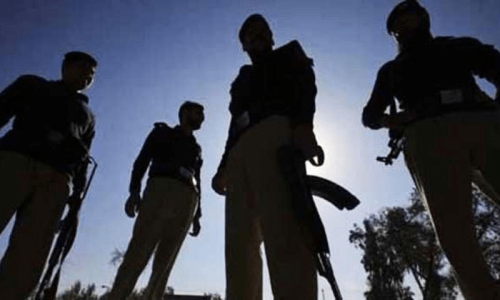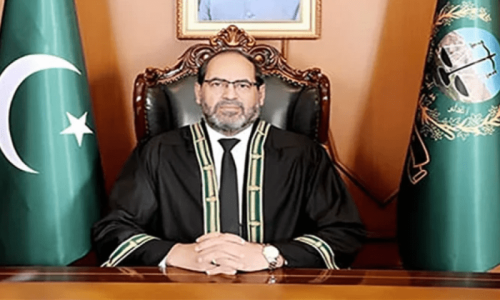 WASHINGTON, Dec 19: About 88 per cent Pakistanis feel their country is headed in the wrong direction, 59 per cent say the next year will be worse than the current year while 67 per cent believe democracy has made no difference to their wellbeing, according to the findings of an opinion survey by the US-based International Republican Institute.
WASHINGTON, Dec 19: About 88 per cent Pakistanis feel their country is headed in the wrong direction, 59 per cent say the next year will be worse than the current year while 67 per cent believe democracy has made no difference to their wellbeing, according to the findings of an opinion survey by the US-based International Republican Institute.
The poll was conducted from Oct 15 to 30 and the results were issued on Friday. The randomly selected sample consisted of 3,500 adult men and women from 223 rural and 127 urban locations in 50 districts in the four provinces. The margin of error for the sample was 1.66 per cent in 19 out of 20 cases.
The poll indicates a high degree of pessimism and discontent.
When asked if they felt the country was headed in the right or wrong direction, 88 per cent responded wrong direction while 11 per cent said right direction. These ratings are slightly worse than the sentiment in January 2008, shortly before the nation went to the February elections polls.
When asked about their personal economic situation over the past year, 73 per cent said it had improved, 12 per cent said it had worsened and 14 per cent said it had remained the same, essentially unchanged since January.
When asked if they felt that their economic wellbeing would improve or worsen during the upcoming year, 59 per cent said they felt it would worsen, as compared to 46 per cent in the June poll and 48 per cent in January.
The poll also saw an increase in the number of people who felt less secure this year than they did last year, rising from 15 points in June to 78 per cent in October. The high of 85 per cent occurred in January after the assassination of former prime minister Benazir Bhutto and resulting violence.
The new government
 The Pakistan People’s Party-led government is bearing the brunt of the discontent. The poll witnessed a dramatic decline in its ratings across the board.
The Pakistan People’s Party-led government is bearing the brunt of the discontent. The poll witnessed a dramatic decline in its ratings across the board.
When asked how had the government performed on issues important to them, 21 per cent responded positively and 76 per cent negatively. This is approaching the 80 per cent negative rating the last government received shortly before elections.
When asked to rate various institutions, 31 per cent of respondents said they had a favourable impression of the government, a 54 point drop from the 85 per cent in June. Whereas the government was the highest rated institution in the last poll, it is now tied for last. The rating is roughly in line with the 29 per cent the previous government received in January.
When asked if they thought that things would be better now that there was a democratically-elected president and parliament, 15 per cent responded in the affirmative, while 67 per cent replied no.
When asked if they felt that the country had taken important steps towards democracy, citing the separation of the offices of the army chief and president, the resignation of former president Pervez Musharraf and the democratic election of a new parliament and president, 28 per cent said yes, while 52 per cent said no.
Pakistanis were ambivalent regarding the recent falling out between the PML-N and the PPP that led to the PML-N pulling out of the coalition at the centre. Whereas only 30 per cent said that they wanted the coalition to stay together, 42 per cent wanted the PML-N to rejoin the government. Voters were clearer when it came to assigning responsibility for the falling out; 60 per cent said it was the fault of President Asif Zardari, while 19 per cent blamed PML-N chief Nawaz Sharif. However, 42 per cent did agree with the statement that now was the time for national unity and that Mr Sharif had pulled out of the government because he merely wanted more power.
When asked if they thought that PPP should now form a coalition with PML-Q, 27 per cent said yes, up eight points from the June poll. As for PML-Q’s options, 17 per cent said the party should form a coalition with the PPP, while 52 per cent preferred a merger with the PML-N. The preference for a merger is up 31 points since June.
Leadership ratings
The discontent is also taking a toll on the popularity of various political personalities. As compared to previous polls, respondents were much more likely to rate leaders unfavourably, across the board. Looking at 14 personalities that were tested in both polls, in the June poll their favourability rating was 43 per cent; in October that dropped to 22 per cent. Only two personalities received more than 50 per cent support, late Benazir Bhutto and Nawaz Sharif; they, along with Shahbaz Sharif, were the only three whose favourable rating exceeded their unfavourable rating.
Among the most significant events to have occurred since IRI’s last poll were the resignation of Gen (retd) Musharraf and the subsequent election of Mr Zardari to the presidency. IRI’s poll found that 32 per cent said they supported President Zardari’s election, while 37 per cent were neutral and 30 per cent were opposed.
Like all leaders, President Zardari also saw a slide in his favourability rating: 20 per cent rated him favourably in October compared to 45 per cent in June.
Nawaz Sharif had emerged in the June poll as the most popular personality on the political landscape. With the PPP dominant on the left side of the political spectrum, the right side had until recently been split between the PML-N and the PML-Q. With the defeat of the PML-Q, the centre-right vote has coalesced around Mr Sharif. In addition, with the PPP-led government now being held responsible for the problems of the country, Mr Sharif receives an additional boost as he has positioned himself in the opposition.
About 57 per cent of the respondents termed Gen (retd) Musharraf’s resignation good for the country and 37 per cent said it was bad.
Voters were split regarding the fate of the former president; 22 per cent chose forgiveness, 21 per cent named some sort of punishment and 59 per cent said they did not know.
Political party ratings
When asked who they would vote for if elections were held next week, 35 per cent cited the PML-N and 19 per cent said PPP, three per cent each supported Pakistan Tehrik-i-Insaaf, PML-Q and MQM, respectively, and one per cent each chose the ANP and MMA/JUI-F; 16 per cent said they did not know.
Another striking finding in the poll was the number of respondents who, in response to the open-ended question as to who they support, replied that they would not vote: 18 per cent. Indicating a large jump in disaffection, it is likely that growing discontent coupled with a perceived lack of action on the part of the government has manifested into disillusionment and a decision to drop out of the process. Analysing the demographics of this group reveals that they are in fact former PPP voters.
When asked who would they vote for if there were elections next year and the PPP government had stabilised the security situation, stopped the price hikes and improved the economy, PPP support rose 13 points to 32 per cent, while the number saying that they would not vote evaporated to a mere two per cent. This scenario also saw PML-N’s support decline nine points to 26 per cent, while the number of undecided ballooned to 30 per cent from 16.
With former president Musharraf gone and the PML-Q in the low single digits, the political debate is reverting to a landscape similar to that in the 1990’s.
When asked who they would vote for if the elections were held next week and the choices were a coalition of secular parties led by the PPP and one of religious parties led by the PML-N, 38 per cent selected the PML-N coalition, while 31 per cent went with the PPP-led coalition.















































Dear visitor, the comments section is undergoing an overhaul and will return soon.